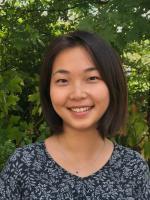
Student Profiles

1 Search Results

Jiali Zhang
NIH Oxford Scholar
B.S. Neuroscience, Johns Hopkins University
Dr. Kareem Zaghloul (NINDS)
and Prof. Tim Behrens (Oxford)
Cognitive neuroscience, Artificial intelligence, Functional neurology
Jiali graduated Phi Beta Kappa from Johns Hopkins University in December 2019. Her interest in Computational Cognitive Neuroscience took shape over several diverse research experiences throughout her undergraduate career.
While participating in a rigorous biochemistry program at the University of Oxford her sophomore year, what began as a final project evolved into a cross-continental study of diabetes, stroke, and the development of dementia under the supervision Dr. Gina Hadley. This work cumulated in a couple of systematic reviews and prompted her long-term interest in applying research to functional neurological diseases. While at Oxford, Jiali was an executive board member of the Oxford AI Society, where she discovered her interest in the intersection of artificial and natural intelligence. Upon returning to Hopkins, she founded and chaired the Johns Hopkins AI Society, generating interdisciplinary discussion regarding AI applications in research, healthcare, and other industries among students and faculty. As a junior, she explored the use of AI in stroke research at the Brain Behavior Learning and Animation Lab, where she built a powerful computer to implement a deep learning algorithm that accurately tracks hand joint positions to study post-stroke rehabilitation. That following summer, she interned in Dr. Chris Baker’s Lab at the NIMH, where she studied human visual perception using artificial neural networks. This project earned the Provost’s Undergraduate Research Award, allowing her to continue it throughout her senior year at Hopkins.
As an NIH-Oxford Scholar, Jiali aims to use computational modeling and a combination of intracranial and neuroimaging brain data to explore how humans harness sparse information and previous experiences to efficiently navigate new environments. She plans to attend medical school after completing her D.Phil. to combine her research with clinical practice as a physician-scientist. She hopes to conduct research that will further our understanding of natural intelligence and improve AI technology, while pushing the frontier of AI in medicine in translating her research to better diagnose and treat functional neurological disorders.


